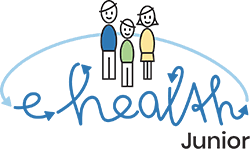For children and adolescents with chronic illnesses, there is often more at play than the illness in itself. They may feel alone, depressed, anxious, angry, or misunderstood. These children and adolescents are more likely to develop mental health problems, such as depression or anxiety. Research shows that it helps to get involved early and that it is better to prevent mental health problems than to cure them afterwards. But how do you prevent these problems among children and adolescents with chronic illnesses? To this end, the eHealth Junior consortium is developing a platform of apps for 1 million chronically ill children, focusing on resilience and self-insight.
Apps for resilience and self-insight
With eHealth Junior, the consortium aims to make a platform of apps accessible to 1 million children and adolescents with chronic illnesses. The consortium believes that resilience and self-insight help support healthy development. The apps use aspects of serious games to promote resilience and self-insight and mitigate or prevent the effects of illness. For example, in one of the apps, children and adolescents are presented with challenges that are not only fun to do, but also incorporate principles of cognitive behavioral therapy. There are also personalized feedback elements in the apps, based on the Experience Sampling Method.
A multidisciplinary approach
The consortium consists of a wide range of scientists, healthcare professionals, game designers, and partners who are involved based on their expertise. They form a unique and multidisciplinary team. Chronically ill children are also given a voice in what they consider important and are actively involved in the development of the apps. The consortium is led by Manon Hillegers (child and adolescent psychiatrist at Erasmus MC).
Different research clusters
In order to make the best use of the multifaceted expertise of the consortium, the project is divided into several research clusters:
- Development
- Evaluation
- Implementation
The Tilburg School of Social and Behavioral Sciences participates in two clusters. Eeske van Roekel (Developmental Psychology) leads a work package on person-based measurement as part of the Evaluation cluster. Inge Bongers and Eveline Wouters (both Tranzo) are cluster leaders of the Implementation cluster.
Personal measurements
Eeske van Roekel (Developmental Psychology) is going to lead the work package on person-based measurements (within the Evaluation cluster). In this work package, the Experience Sampling Method (ESM) plays an important role. When children use the apps, they fill in short questionnaires on, for example, how they feel, whom they are with, and what they are doing. The work package on person-centered measurement examines how children can get feedback based on the insights the apps provide. The focus will be on how data can best be presented, so that children understand the feedback and know what they can do with it. In addition, the quality of the data needs to be carefully examined. When can data be given as feedback and when not? New instruments will be developed to assess the psychometric quality of each child’s ESM data.
Implementation of the apps
To make the platform of apps available to all children with a chronic condition, it is necessary that the apps can be used in daily (care) practice. Inge Bongers and Eveline Wouters of Tranzo, together with Fontys, are responsible for the implementation. They are specifically looking at how the apps can be made accessible to the children, parents, and care professionals. In addition, they are examining the organizational and management challenges that come with such a large project. If all of this is done well, the social impact is the greatest. There are also ethical, legal, and financial factors that play a role. These aspects are being investigated by TU Twente.
Funding
The eHealth Junior consortium has received 4.9 million euros from the “Research along Routes by Consortia” program of the NWO (Dutch Research Council).
The core team
The core team of the eHealth Junior consortium consists of a collaboration between Erasmus MC-Sophia (Prof. Manon Hillegers), Erasmus University Rotterdam (Prof. Loes Keijsers), University Medical Center Utrecht (Dr. Sanne Nijhof), Fontys Hogescholen Eindhoven (Prof. Eveline Wouters) and Tilburg University (Prof. Inge Bongers and Prof. Eveline Wouters).
The eHealth Junior website (Dutch only) lists all consortium members and partners, and you can read more about the consortium.

